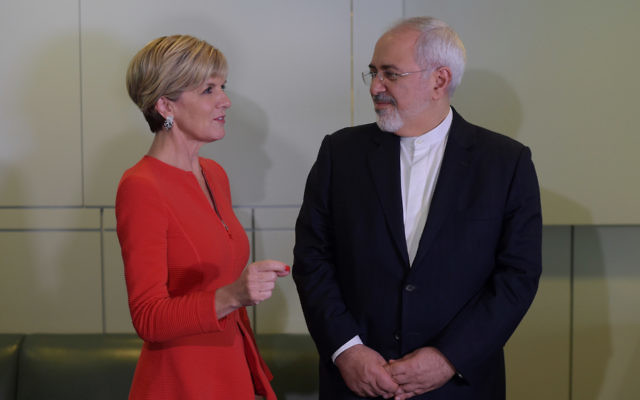Bishop tackles Zarif over Israel
AUSTRALIAN Foreign Minister Julie Bishop said she raised Australia’s “deep concern” about Iran’s behaviour towards Israel when she met with her Iranian counterpart Mohammad Javad Zarif in Canberra on Tuesday.
AUSTRALIAN Foreign Minister Julie Bishop said she raised Australia’s “deep concern” about Iran’s behaviour towards Israel when she met with her Iranian counterpart Mohammad Javad Zarif in Canberra on Tuesday.
The pair met just days after Iran tested two ballistic missiles with “Israel must be wiped out” written in Hebrew and Persian on their sides.
The sentiment echoes a number of statements from Iranian leaders over the years.
Amid claims from Opposition MPs and concerns in the Jewish community over the government’s softening stance towards the Islamic Republic following last year’s nuclear deal, Bishop told The AJN that a ministerial visit does not imply Australia accepts Iran’s world view or attitudes, but it “provides an opportunity to raise issues that are of deep concern”.
Insisting she was able to convey messages “in a forthright manner”, Bishop stated, “As I said I would, I raised the issue of the recent ballistic missile test and I raised the issues of the anti-Israel sentiments allegedly inscribed on the missiles.
“He [Zarif] maintains the general who is accused of writing the offensive anti-Israel comments on these warheads has in fact been the one that stated publicly that these missiles will not be used against any other country other than in self defence,” Bishop said.
“Israel is entitled to be deeply concerned – we raised these issues with Iran.”
Zarif defended the missile testing when he spoke at a joint press conference with Bishop and said that Iran has a right to defend itself. “Missiles are a means of defence which we need,” he claimed, before challenging other Middle Eastern countries to state that they would only use their missiles in self-defence. “We use far less resources in defence than others in the region,” he claimed.
Later on Tuesday, he sought to portray Israel as the aggressor when he spoke at the Australian National University (ANU) in Canberra.
“Israel on a daily basis says that they are going to attack Iran. It buys bunker-busters that can even destroy Iranian nuclear facilities … releasing radioactive material into the air that would kill millions of people,” Zarif said. “I do not see an Australian politician … expressing concern about Israel threatening to use force against Iranian nuclear facilities that then cause an environmental and humanitarian catastrophe.”
Bishop also told The AJN that as part of her meeting with Zarif she called for a moratorium on the death penalty. She told Zarif that as part of Australia’s bid for a position on the United Nations Human Rights Council it would be calling for the abolition of the death penalty across the world.
“The Foreign Minister said they do not carry out the death sentence for political prisoners, but for traffickers, and they are not the only country that does that,” Bishop said.
“I asked for them to consider a moratorium on the death penalty, not only because of the public hanging and the method of execution, but also because of the number of young people and juveniles.”
While Zarif was in Canberra he also met with the Joint Standing Committee on Foreign Affairs, Defence and Trade, which included Melbourne Ports MP Michael Danby.
Danby challenged Zarif on Iran’s views towards Israel and asked if Iran would recognise Israel if a two-state solution was agreed to by Israel and the Palestinians.
According to Danby, Zarif said that peace was unlikely “because the Zionists have showed themselves incapable of negotiations with the Palestinians”.
JOSHUA LEVI


comments